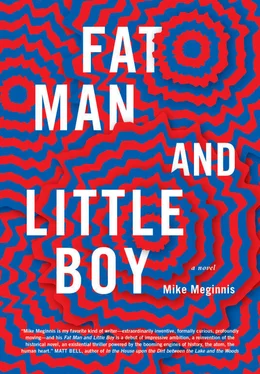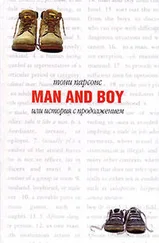The movie shows footage of the mushroom clouds rising over Japan. Tendrils of smoke. Billow and bloom. Dust, and flaws in the film—the film’s flaws are like a part of the bombs, another kind of explosion.
“So that’s how it was,” whispers Matthew, hoarsely. “I thought it was different.”
The Ace goes home. He goes there in a plane, but someone else is flying. He’s just miserable. But the audience knows what he doesn’t know—how excited are his mother and father, all the girls at home, his chums, some also returning, but none so decorated as he.
At home he rides a bus a long time. When he gets off the bus he walks to a barn and waits there. His father picks him up in a car. They ride together in silence. His mother hugs him when he gets home, but it’s somehow not like what Rosie imagined. The picture lingers with The Ace a while. He finds a job at a hardware store. Women depend on him to take down paint and other things from high shelves. The girls who were so hungry to see him back never materialize. He spends most of his time alone, the way he did before. There’s a parade. It doesn’t make him happy. Something about the bomb, thinks Rosie. He couldn’t consummate his mission, did not in fact kill Every Blasted Japanese, did not conquer the Pacific. If they had dropped the bombs a year before, how much would it have changed things? Would his friends have had to die?
But it’s more than that. Rosie wonders where the engine sound has gone that covered all the hometown dialogue, which can now be heard clearly. She realizes that there was never any letter about The Ace’s heroism, that the newspaper articles were never written, that the girls never dreamed of his coming home. These were his fantasies. Each vision was always preceded by a slow advance of the camera on Danny’s face. This was the movie entering his mind.
The film ends with Danny Ericson watching a more handsome veteran dance with the girl of his dreams. Meanwhile Danny—now twenty-one—smokes a cigarette and drinks on what seems to be his usual stool at the bar. The credits scroll over a brassy, hopeful orchestral song that gives no quarter to the tragedy of the film’s conclusion.
The part that will stick in her throat like a fish bone is the way they edited the film. It was all fades and wipes, or shots of similarly shaped things transposed on one another, so that an apple became a target, a pen became a plane, a cloud became a newspaper, a bullet a paint can, the sun a woman’s eye, a woman’s eye a firework, the firework an exploding American plane, the shrapnel confetti, peanut shells candle drippings, bunk bed dessert cart, whipped cream fire, the bombs became each other, became a tall building, the windows of the building became the eyes of the people who watched the parade, lining the streets. Everything was something else and nothing was itself. It made her teeth chatter.
They leave as soon as it’s polite. John won’t stop saying what a brilliant couple of actors they were. “You could tell them apart,” he says, “or anyway I could tell them apart, absolutely, but still, what a couple of actors. Real movie stars.” They get in the car. “Or maybe I couldn’t tell them apart. Maybe I’m wrong about that. Imagine it though. Having a brother who looked and acted just like you. Wouldn’t that be weird?”
“The bomb was different from what I pictured,” says Matthew. “It looked really different.”
“I think it would be strange,” says John. “Picture another man like me sitting here beside me, saying the things I’m saying, thinking what I’m thinking.”
“Widows ought to get more for what we give up,” says Rosie. “If he’d have lived after he hung from his parachute in that tree—if they’d shot him just enough times that he could still be saved—they would’ve had to spend probably thousands patching him up, keeping him in the hospital, attaching prosthesis. Then training him in the use of his new hands. They’re lucky he died. They only have to pay me my allowance. They’re better off if the wounded soldiers die. That’s called a perverse incentive.” She punches the steering wheel.
John touches her arm. She knocks his hand away.
THE MEDIUM AND
THE MEDIUM
The thing about the hotel—the thing about the prison—is there aren’t many dead people walking the grounds. Some do lay around there, rolling from side to side, clutching their stomachs in hunger. Thin as pens. Sometimes Masumi sees a baby crying in his room, hid beneath the bed.
The thing about seeing the dead is objects don’t leave ghosts. He would have thought they would. He didn’t know he would have thought that, but he would have—after he could see, their absence struck him as strange. That you cannot find them with the dead might suggest that objects are still and always alive, however they degrade.
Masumi goes into Rosie’s library. He finds her in the stacks, reading from the back of a book written in Italian.
He says, “You don’t speak Italian.”
“Maybe I should. It’s a lot like Spanish.”
“Which is a lot like French.”
“So it should be easy.”
“Some find it works that way,” says Masumi. “Some find it confusing. You get a certain number of cognates commingling in the same cerebellum, it all starts to run together. Large in English is grande in Italian. Same thing in Spanish, same pronunciation. In French, it’s the same but you say it a little different. Largo , though, sounds like large, but in Spanish it means long—it’s a false cognate, in other words. In Italian it means wide, or broad, sometimes with connotations of liberalism, as in broad-minded. In French, of course, long is long . In Spanish, wide is ancho , unless we’re talking about a gap, in which case it’s grande again. In French, broad is large . A wide margin is grand . Of course, in English, a grand thing is sometimes very large and sometimes not. Sometimes it’s a thousand. In German, wide is called gross . It’s gross to be wide. In English, a gross is one hundred forty-four of the same thing. Not a thousand. Of course, if you’re talking about width in terms of roundness, fatness, it’s dick .”
Rosie’s face twitches at the left cheek. The twitch becomes a pained smile. “As in penis?”
“No, dick as in fat.”
“Does it bring you peace knowing all that language?”
“I’ve always got a word for anything I feel, and there are lots of people I can talk to.”
“Do you talk to them?”
“No. It’s good to know I could, though.”
“You don’t seem at peace,” says Rosie. “What you did to Matthew. You don’t need to explain. I wouldn’t be impressed. Just don’t do it again. Find peace or get out of my hotel.”
Masumi says, “There’s something about this place. You know when I heard what you did with the camp I thought it was in quite poor taste. In fact, I still do. But something about that works for me. The crass American willingness to build on a graveyard, to erase history. But the cabins are beautiful. And, if I am honest with myself, it is good to study language once more. That study used to be the center of my life.”
Rosie listens with a stern, warning expression on her face, lips tucked in, eyes wide and unblinking.
“Don’t worry,” says Masumi, “I’ll be good. I won’t be any trouble. If I start to be trouble again, then I’ll leave.”
“See that you do,” says Rosie. She can speak a cliché without the slightest indication she knows it as such. It sounds pure and cold and new. “I don’t need your money.”
“I don’t think that’s true.”
They part on these terms. Rosie leaves the Italian book behind, unshelved. He slides it into place for her, running his hand over the spines to even them.
Читать дальше












